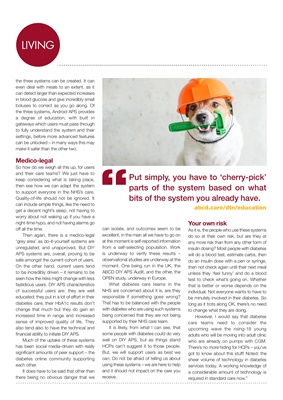
LIVINGLIVING
with meals to an extent, as it can detect
larger than expected increases in blood
glucose and given incredibly small boluses
to correct as you go along. Of the three
systems, Android APS provides a degree
of education with built in gateways users
must pass through to fully understand the
system and their settings before more
advanced features can be unlocked - in
many ways this may make it safer than the
other two.
Medico-legal
So how do we weigh all this up, for users
and their care teams? We just have to
keep considering what is taking place,
then see how we can adapt the system
to support everyone in the NHS's care.
Quality-of-life should not be ignored. It
can include simple things, like the need to
get a decent night's sleep, not having to
worry about not waking up if you have a
night-time hypo, and not having alarms go
off all the time.
Then again, there is a medico-legal
'grey area' as do-it-yourself systems are
unregulated, and unapproved. But DIY
APS systems are, overall, proving to be
safe amongst the current cohort of users.
On the other hand, current users tend
to be incredibly driven - it remains to be
seen how the risks might change with lest
fastidious users. DIY APS characteristics
of successful users are: they are well
educated; they put in a lot of effort in their
diabetes care; their HbA1c results don't
change that much but they do gain an
increased time in range and increased
sense of improved quality of life. They
also tend also to have the technical and
financial ability to initiate DIY APS.
Much of the uptake of these systems
has been social media-driven with really
significant amounts of peer support ¬- the
diabetes online community supporting
each other.
It does have to be said that other than
there being no obvious danger that we
can isolate, and outcomes seem to be
excellent, in the main all we have to go on
at the moment is self-reported information
from a self-selecting population. Work
is underway to verify these results -
observational studies are underway at the
moment. One being ran in the UK, the
ABCD DIY APS Audit, and the other, the
OPEN study, underway in Europe.
What diabetes care teams in the
NHS are concerned about it is, are they
responsible if something goes wrong?
That has to be balanced with the people
with diabetes who are using such systems
being concerned that they are not being
supported by their NHS care team. It is
likely, from what I can see, that some
people with diabetes could do very well
on DIY APS, but as things stand HCPs
can't suggest it to those people. But, we
will support users as best we can. Do not
be afraid of telling us about using these
systems - we are here to help and it
should not impact on the care you receive.
Your own risk
As it is, the people who use these
systems at their own risk, but are they at
any more risk than from any other form of
insulin dosing? Most people with diabetes
will do a blood test, estimate carbs, then
do an insulin dose with a pen or syringe,
then not check again until their next meal
unless they 'feel funny' and do a blood
test to check what's going on. Whether
that is better or worse depends on the
individual. Not everyone wants to have to
be minutely involved in their diabetes. So
long as it trots along OK, there's no need
to change what they are doing.
However, I would say that diabetes
care teams need to consider the
upcoming wave the rising-18 young
adults who will be moving into adult clinic
who are already on pumps with CGM.
There's no more hiding for HCPs - you've
got to know about this stuff! Noted: the
sheer volume of technology in diabetes
services today. A working knowledge of
a considerable amount of technology is
required in standard care now."
"Put simply, you have to 'cherry-pick'
parts of the system based on what
bits of the system you already have.
www.abcd